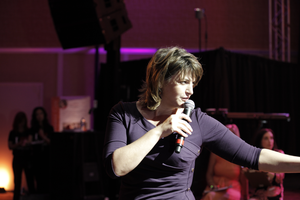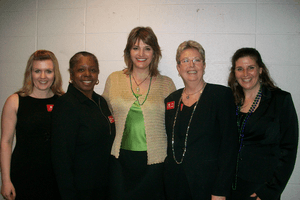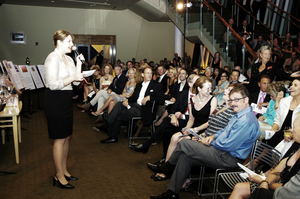
If you’re new to charity auctions or new to working with auctioneers, you might be unsure of how to go about finding and selecting a benefit auctioneer.
Here are six steps auction planners can use to not just survive the selection process, but actually enjoy the conversations.
#1: Locate some benefit auctioneers
If you’re starting from a blank slate, visit the National Auctioneers Association website and use their “Find an Auctioneer” search tool. Auctioneers with a “BAS” (Benefit Auctioneer Specialist) credential indicates that he or she has had specific benefit auction training.
A BAS designation should not be your deciding criteria, but it gives you a place to start when weeding through the masses.
Similarly, many state auction associations have a similar search tool for finding auctioneers in your area.

Another great option is to call other nonprofit leaders whom you respect. Ask them whom they use and why.
#2: Research and compare auctioneers by studying websites
A business without a website isn’t doing much business.
You can glean a lot about how serious a company is by reviewing how they present their business online.
- Is the content fresh?
- Do they have videos?
- Are they active in their communities?
- Are they relevant?
I regularly have auctioneers contacting my company, inquiring as to whether I’m hiring contract auctioneers. Before calling them back, the first action I take is to Google them and see if I can find their website. If I can’t find a website, photos, and videos, I’m not interested. It tells me a lot about their presentation. You’ll be able to pick up on similar cues.
Tip #1: If an auction company’s home page seems to mention many types of auctions, such as real estate, auto auctions, or heavy machinery, review their Facebook page instead. Whatever they are most often posting about is their specialty. Fundraising auctions might be their afterthought — not a business focus.
Tip #2: Do a Google search on “name” (EG “Sherry Truhlar”) and “auctioneer.” Do not search on “name” and “fundraising auctioneer.” The reason being is that some auctioneers will have two websites — a large website for their primary business (selling real estate, livestock, etc) and a smaller website for their fundraising auction work. It’s your decision, but when I’m hiring a professional, I want someone who is working 24 X 7 in what I’m paying them to do. I don’t want to hire someone who is marketing real estate and other assets by day, and ‘fitting in’ some fundraising auctions in the evening.
#3: Create a form with standard questions and call some auctioneers
I tend to think it’s best if you can talk with all of your candidates within a few days of each other so you can compare them in one swoop.
Key questions to ask:

- Are you available on our gala date? If not, who would be working our event? (Some auctioneers contract work out to other auctioneers. You should research both auctioneers and understand how they’ll interact with you pre-gala.)
- How many events do you conduct per year?
- How many events have you overseen with our guest count?
- Could you describe the way you work with clients?
- Do you have a video? (If they don’t, be leery. Ask when you can watch them perform.)
- Can I speak with some of your clients who hold events similar to ours?
- Could you explain your service offerings and pricing structure?
- Whatever else is relevant for your event (emceeing, for instance).

Tip #1: Don’t begin by asking, “How much do you charge.” In most cases,the auctioneer will need to know a bit about your event before quoting a price.
Tip #2: If you’re familiar with the Kepner-Tregoe ranking and weighting method for making decisions, it might be fun to use that process to help you decide. If not, don’t worry about it.
#4: If the auctioneer has given you referrals, call them.
When you call the referral, ask if he or she is – in any way, shape or form – related to the auctioneer.
If they aren’t, ask about the auctioneer’s communication and performance style. We already assume the group liked the auctioneer (they are a referral, after all), but we want to find out if the auctioneer’s style would fit in with our guests and organization. Ask questions focused on that.

#5: If you want a proposal or need a final interview, set it up.
Request a proposal only if you’re serious about the auctioneer. If you need the auctioneer to meet Board members or other key decision-makers, you can ask for another meeting. The auctioneer might not have time for that, but if so, set up the meeting.
#6: Ladies, it’s OK to say no.
If you’re not into an auctioneer or know that you don’t need his or her services, don’t ask for a proposal. It’s completely fine to say, “no thank you.” You won’t burn bridges or hurt feelings unless you drop the ball.
But if you’ve moved along and received a proposal, it’s only polite to let the auctioneer know when you opt for someone else. Send an email or call them to thank them for their proposal. Let them know you’ve opted for another candidate but will keep them in mind for next year.
When I worked as an event planner at GE, I always called my vendors to deliver the bad news. I wanted to be polite as I might want to work with them on a different function. I hoped my courtesy would be remembered.
Good luck with your search. And if you feel Red Apple Auctions might be a fit for you, I’d enjoy chatting. Set up a meeting here.